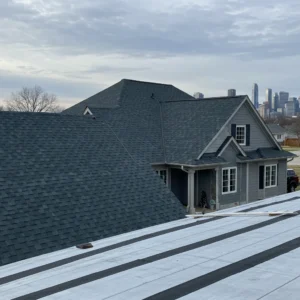What Do Roofers Do?
Discover the daily responsibilities, skills, tools, and job settings that define a roofer’s essential role in the construction industry.

Understanding the Role of a Roofer
A roofer works with many types of materials to build or fix a roof. They handle tasks like measuring roofing spaces, cutting materials to fit, placing underlayment, and installing the final layer—whether that’s shingles, metal sheets, tiles, or other materials. Their job is to make sure the roof is sealed tightly, water-resistant, and built to last. They also follow strict safety rules. Roofers use tools like ladders, nail guns, and harnesses, and always wear personal protective equipment (PPE) to stay safe. Knowing how to handle ladder usage and fall protection is a big part of staying injury-free on the job. Some roofers earn as little as $17 an hour, while experienced ones can make over $38 an hour. These wages change based on specialization, location, and how long someone has been in the roofing industry. Roofing contractors who install metal roofing, slate roofs, or solar shingles often get paid more than those who work with regular shingles. Whether you're a laborer, sales associate, or eventually become a production manager, the roofing industry has lots of opportunities to grow your income.
Key Services Roofers Provide
Roofers handle a wide range of services that are essential to keeping buildings in good shape. They install new roofs on residential homes, commercial properties, and even industrial buildings. They also repair roofs that have been damaged by wind, rain, or age—fixing broken shingles, patching holes, and sealing leaks to prevent further issues. Maintenance is another key part of their job. This includes cleaning gutters, removing debris, inspecting the roof for damage, and keeping everything in working order to extend the life of the roof. Without regular roof maintenance, buildings can suffer from leaks, mold, or even structural damage.
Where Roofers Work and What to Expect On the Job
Roofers work in many environments, depending on the job. They may be on residential homes, climbing ladders and working on pitched roofs in neighborhoods. In larger projects, they work on commercial buildings, warehouses, or multi-unit housing complexes, where flat or low-slope roofs are common. In industrial facilities, such as factories and manufacturing plants, roofers must take extra care around machinery and follow site-specific rules. On construction sites, roofers coordinate with other trades like plumbers, electricians, and carpenters. It’s an active, hands-on job where the setting changes frequently. One day, a roofer might be on a high-rise downtown; the next, working on a small home in the suburbs.
Contents
- Understanding the Role of a Roofer
- Key Services Roofers Provide
- Where Roofers Work and What to Expect On the Job
- Skills and Traits That Make a Good Roofer
- Career Pathways in Roofing and Construction Trades
- Average Roofer Salary and Job Outlook
- Residential vs Commercial Roofing Work
- Common Roofing Materials and Roofing System Types ?
Skills and Traits That Make a Good Roofer
Good roofers share a unique combination of traits that help them succeed in their field. They must have attention to detail, so their work is accurate and secure. Safety awareness is critical, since they often work at heights. Many roofers are hands-on people who enjoy physical, mechanical tasks and solving problems on the spot. Strong communication skills also help roofers coordinate with clients and teammates. Most successful roofers have what’s called a realistic personality—they’re practical, independent, and focused. Others also have investigative qualities, enjoying work that involves careful thinking and figuring out solutions.
Career Pathways in Roofing and Construction Trades
There are several ways to become a roofer. Many start through roofing apprenticeships, where they learn from experienced professionals. Others go through vocational training programs or earn trade-related degrees in construction. As their skills grow, roofers may specialize in certain roofing systems, become job foremen, or even start their own roofing business. Careers in roofing can lead to long-term opportunities in the construction industry, including project management or contracting.
Average Roofer Salary and Job Outlook
In the United States, the average roofer earns about $11,597 per year. Entry-level workers may start closer to $8,400, while skilled roofers can earn up to $16,010 annually. These numbers may seem modest, but roofing offers steady work, especially in areas with strong housing or commercial development. Job demand remains consistent because every structure needs a durable roof. As older buildings require repairs and new buildings go up, roofers continue to find solid opportunities for work.
Residential vs Commercial Roofing Work
There’s a difference between residential and commercial roofing work. Residential roofers usually work on homes and small buildings using shingles, slate, clay tiles, or concrete tiles. Their tasks may include working around landscaping, discussing plans with homeowners, and ensuring the roof complements the home’s style. Commercial roofers, on the other hand, work on larger buildings with flat roofs or low slopes. These projects may involve materials like EPDM, TPO, PVC, or metal roofing. Commercial work often requires larger crews, more planning, and stricter building codes.
Common Roofing Materials and Roofing System Types
Roofers work with many different materials, depending on the job. Asphalt and fiberglass shingles are popular for residential homes because they are affordable and easy to install. Metal panels, made of steel, aluminum, or copper, are more common on commercial and industrial buildings. Slate, clay tiles, and concrete tiles offer durability and style but require special skills to install. On flat roofs, roofers often use systems like modified bitumen, built-up roofing (BUR), or single-ply membranes such as EPDM, TPO, or PVC. There’s also a growing trend toward green roofing systems, which include soil and plants for better insulation and environmental benefits. Some roofers choose to specialize. Shinglers work mostly with shingles, while metal roofers handle metal installations. Others, like flat roofers or green roof installers, focus on specific types of buildings or technologies. Each specialty requires its own set of tools, skills, and experience.

What Do Roofers Do?
Premium Roofing Solutions Blog What Do Roofers Do? Discover the daily responsibilities, skills, tools, and job settings that define a roofer’s essential role in the
